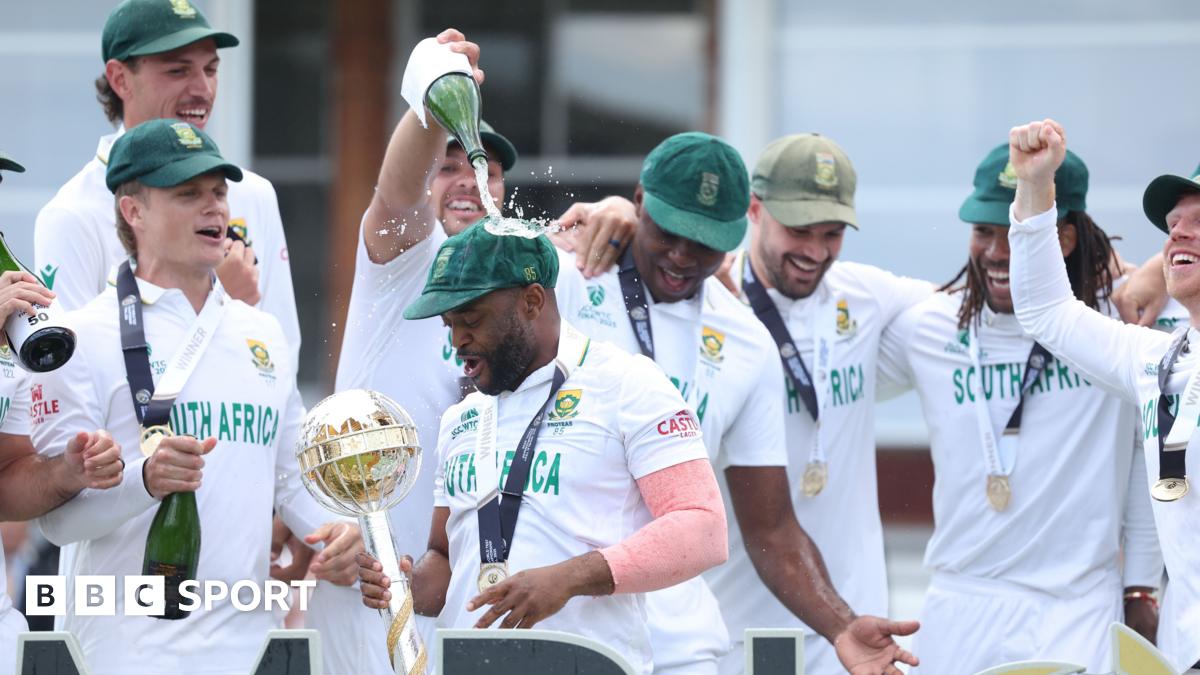To play this video you need to enable JavaScript in your browser.
- 27 Comments
“Surely, we can’t mess this one up?” Shaun Pollock said as the lift at the Lord’s media centre plummeted downwards shortly after stumps on day three.
The fact the former South Africa captain, here on commentary duties, felt even the slightest tinge of nervousness after a day of batting domination offers an insight into the cricket psyche of his country.
That there still was a chance the Proteas – who carried the moniker as professional sport’s biggest chokers – could somehow contrive to make a dog’s dinner of scoring 69 runs to win the World Test Championship (WTC).
Aiden Markram resumed on an unbeaten century but like many of his team-mates, had a restless night at their London hotel pondering how things might pan out.
Even the sleeping tablets he took could not help him switch off.
It’s hard to imagine their opponents, Australia, suffering from the same chronic lack of self-conviction. From this position, they would have peacock-strutted to the line.
Australia’s players saw it as an opportunity, too.
They picked at this particular South Africa scab with their verbal armoury of salty snipes when a tense chase began.
“Whilst we were batting, we could hear the Aussies using that dreaded word, choke,” South Africa skipper Temba Bavuma told BBC Test Match Special.
“It’s been years since we’ve overcome a final, we’ve been etched in history. Now we’re part of something that has never been done.”
To play this video you need to enable JavaScript in your browser.
In 18 previous one-day international and T20 World Cups, South Africa’s men’s team have reached a solitary final, having lost 10 of their 12 knockout matches across both competitions.
Strictly speaking, South Africa’s men have won global events before. Although it’s debatable whether you can class them as major.
They lifted the inaugural 1998 ICC Knockout Trophy in Bangladesh – the tournament was later rebranded as the Champions Trophy by the International Cricket Council.
Earlier that same year, South Africa defeated Australia in the final of the Commonwealth Games played in Malaysia.
Although having netted in underground car parks in Kuala Lumpur and been fascinated by the the size of Jonah Lomu’s lunch, perhaps the tournament was approached in a more leisurely fashion.
This was just the third iteration of the WTC, but you only had to witness the number of Saffers who came through the gates at Lord’s, and the tears from Keshav Maharaj afterwards, to sense what going from chokers to champions felt like.
“It would be great to never hear that word [choke] again, that’s for sure,” said Markram, who went to the stands and downed a pint of beer with an old school friend to celebrate.
“To have got the job done and to get rid of that, it’s a big thing for this team.”
Australia’s sledging perhaps masked some of their own struggles as they build towards hosting an Ashes series against England, with captain Pat Cummins hinting changes could be afoot for a forthcoming tour to West Indies.
“We’ve obviously got a team here that got us to the final so it’s about when do we feel it’s the right time to change,” Cummins, 32, said.
Proteas’ quiet pioneer leads from front
To play this video you need to enable JavaScript in your browser.
When Bavuma walked into the post-match news conference and carefully placed the glittering mace – the prize awarded to the WTC winners – down on the table in front of him, the significance of the moment was not lost.
It is more than three decades since South Africa’s cricketers were readmitted to the international fold following the sporting boycotts established by the Gleneagles Agreement.
Bavuma is South Africa’s first black African batter, first black African to score a Test century, as well as the country’s first black African captain.
He is now the first South African to win a major ICC trophy, and follows in the footsteps of Siya Kolisi, South Africa’s black double World Cup-winning rugby union captain, in breaking barriers.
Bavuma spoke in depth in an interview with BBC Sport before the WTC about South Africa’s post-apartheid era of sporting transformation.
He is a humble and quietly spoken leader in the dressing room, dovetailing with the subtle acumen of head coach Shukri Conrad.
In many ways Bavuma embodies a group of South African players who might lack some of the stardust of previous teams but showed here they have character, depth and unity.
With a beaming smile in the aftermath of this victory at Lord’s, the joy on Bavuma’s face was clear.
“It’s a chance for South Africa to be united. We’ve got a cause where we can put aside our differences and enjoy it,” Bavuma added.
“We are unique in a lot of ways, our present and future is shaped by our past. It is a chance for us to rejoice in something, forget our issues and come together.”
South Africa may be World Test champions but have no home men’s matches in the longer format scheduled for 2025-26.
Markram said its primacy in the country should never be questioned.
“It’s always been my most important and most favourite format. Naturally, playing fewer games is not really on us, it’s just sort of the cards you get dealt,” he said.
Related topics
- South Africa
- Cricket
Source: BBC

Leave a Reply